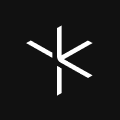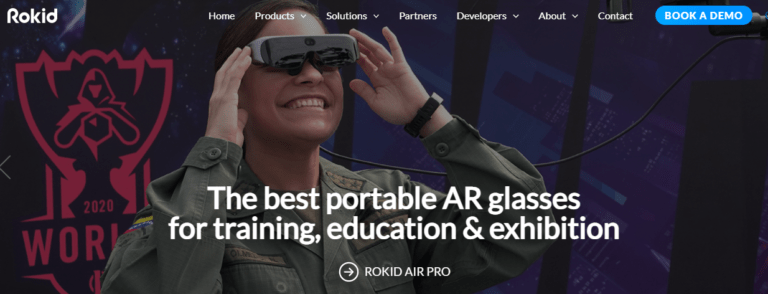
Rokid
Founded Year
2014Stage
Private Equity | AliveTotal Raised
$607.85MMosaic Score The Mosaic Score is an algorithm that measures the overall financial health and market potential of private companies.
-25 points in the past 30 days
About Rokid
Rokid specializes in Augmented Reality (AR) products and services within the consumer and industrial sectors. It offers AR glasses designed for entertainment, virtual office work, and industrial applications, including remote collaboration, AI-powered inspections, and digital workflow integration. Rokid's products cater to individual consumers. The company was founded in 2014 and is based in Redwood City, California.
Loading...
ESPs containing Rokid
The ESP matrix leverages data and analyst insight to identify and rank leading companies in a given technology landscape.
The augmented reality (AR) glasses market develops wearable displays that project digital content onto transparent lenses, allowing users to see computer-generated imagery overlaid on their physical environment. These devices include standalone smart glasses and optical components such as waveguides and light engines that enable AR capabilities. These solutions typically include integrated optics,…
Rokid named as Challenger among 15 other companies, including Google, Meta, and Microsoft.
Loading...
Research containing Rokid
Get data-driven expert analysis from the CB Insights Intelligence Unit.
CB Insights Intelligence Analysts have mentioned Rokid in 1 CB Insights research brief, most recently on Mar 25, 2022.
Expert Collections containing Rokid
Expert Collections are analyst-curated lists that highlight the companies you need to know in the most important technology spaces.
Rokid is included in 5 Expert Collections, including AR/VR.
AR/VR
1,508 items
This collection includes companies creating hardware and/or software for augmented reality, virtual reality, and mixed reality applications.
Unicorns- Billion Dollar Startups
1,257 items
Conference Exhibitors
6,062 items
Companies that will be exhibiting at CES 2018
Smart Cities
1,307 items
Smart building tech covers energy management/HVAC tech, occupancy/security tech, connectivity/IoT tech, construction materials, robotics use in buildings, and the metaverse/virtual buildings.
Artificial Intelligence
7,146 items
Rokid Patents
Rokid has filed 1 patent.

Application Date | Grant Date | Title | Related Topics | Status |
|---|---|---|---|---|
6/11/2018 | 6/30/2020 | Computer peripherals, Display devices, User interfaces, Punched card, Computing input devices | Grant |
Application Date | 6/11/2018 |
|---|---|
Grant Date | 6/30/2020 |
Title | |
Related Topics | Computer peripherals, Display devices, User interfaces, Punched card, Computing input devices |
Status | Grant |
Latest Rokid News
Jan 14, 2025
Smart glasses makers are promising lightweight, stylish frames with limited features that should offer an alternative to bulkier mixed-reality headsets now on the market. Credit: Rokid Smart glasses attracted a lot of attention at last week’s Consumer Electronics Show , with a range of devices on display that combine lightweight frames with functionality such as heads-up displays and AI-powered assistants. These contrast with the mixed-reality headsets that created a buzz early in 2024, including Meta’s Quest 3 and Apple’s Vision Pro – both of which are much heavier devices designed for shorter periods of use. Apple’s Vision Pro headset captured a lot of attention in 2024, but lighter-weight smart glasses were the rage at CES 2025. JLStock / Shutterstock “This year, the focus definitely seemed to be more on smart glasses than on headsets, in part because the Ray-Ban Meta smart glasses were a huge hit last year,” said Avi Greengart, president and lead analyst at Techsponential. Smart glasses require “purposeful compromise,” when it comes to balancing functionality with a lightweight form factor, and “different vendors are making different decisions,” to achieve this, said Greengart. Halliday’s smart glasses , for example, project text and images directly into the wearer’s field of view. This is perceived as a 3.5-in. screen that appears in the upper-right corner of the user’s view, and remains visible even in bright sunlight, Halliday claims. A “proactive” AI assistant — which requires a Bluetooth connection to a smartphone — enables features such as real-time translation in up to 40 languages, live navigation for directions, and teleprompter-style display of notes. Halliday’s smart glasses come in three different colors. Halliday At 1.2 ounces, they’re even lighter than Meta’s glasses (which at 1.7 ounces are only marginally heavierthan regular Ray-Bans). Halliday’s smart glasses are available for preorder for $489, with shipping expected to begin at the end of the first quarter of this year. Even Realities also offers a minimalist take with its G1 smart glasses, which start at $599. These include a micro-LED projector that beams a heads-up display onto each lens, while an AI assistant enables live translation and navigation when paired with a smartphone. Another vendor in the space, Rokid, recently announced its Glasses , a lightweight (1.7 ounces) aimed at continuous use through the day. In addition to a simple green text display and intelligent assistant, Rokid’s device also packs a 12-megapixel camera for image and video capture into the frames. Nuance Audio — owned by Meta’s Ray-Ban partner, EssilorLuxottica — has an even more focused product: glasses that integrate a hearing aid into the frames. “When you need a bit more help hearing someone, you turn them on and the glasses amplify the sound of the person you are looking at and direct it to speakers on the glasses stems that are aimed at your ears,” said Greengart. Meta is rumored to be have an updated version of its Ray-Ban devices slated for release later this year. They his will reportedly feature a simple display to show notifications and responses from Meta’s AI assistant. Meta has sold more than a million Ray-Ban smart glasses to date, according to Counterpoint Research stats . “Most of these glasses are ones that I wouldn’t mind wearing out in public,” said Ramon Llamas, research director with IDC’s devices and displays team. “We’re finally seeing designs that look and feel less bulky, and we’re getting into a bunch of styles instead of the usual wayfarer design.” Other glasses, such as Xreal’s One Pro and TCL’s RayNeo X2 (marketed as “augmented reality” rather than “smart” glasses), are heftier and act as a portable display, with the ability to watch videos and access apps when tethered to a laptop or smartphone. Although demand for smart glasses is still in its infancy, shipments are expected to see a compound annual growth rate of 85.7% through to 2028, according to recent IDC stats . These “extended reality” devices will soon be the second largest category within the broader AR/VR market, IDC predicts, with several million devices sold each year. Mixed reality headsets – such as Apple’s Vision Pro and Meta’s Quest products – will continue to account for the largest share of the AR/VR market, according to IDC, with extended reality smart glasses in second place. IDC Though many of the devices shown at CES are largely aimed at consumers, some smart glasses are also being tailored to enterprise customers ( Vuzix being an example). As the technology matures, Llamas sees a growing range of business use cases for smart glasses: capturing visual information hands-free, for instance, or live translation, which could also be useful for business travelers. “This is where having access to business apps can help, especially if you can speak into those apps to execute a task and the smart glasses can handle that,” said Llamas. “I think we’re still a ways off from that actually taking place, so for now, expect smart glasses to be mostly within the realm of consumers — specifically tech enthusiasts and cognoscenti.” Related content
Rokid Frequently Asked Questions (FAQ)
When was Rokid founded?
Rokid was founded in 2014.
Where is Rokid's headquarters?
Rokid's headquarters is located at 2608 Spring Street, Redwood City.
What is Rokid's latest funding round?
Rokid's latest funding round is Private Equity.
How much did Rokid raise?
Rokid raised a total of $607.85M.
Who are the investors of Rokid?
Investors of Rokid include Jiangxia Science and Technology Investment, Hefei Municipal Government, NetDragon Websoft, Yujiang Industrial Investment Group, Haichuang Venture Capital and 17 more.
Who are Rokid's competitors?
Competitors of Rokid include KIT-AR, Xreal, HoloLight, VIRNECT, Augmentir and 7 more.
Loading...
Compare Rokid to Competitors
0glass is an online video platform that offers a wide range of free VIP TV series, latest movies, popular variety shows, and animated videos for streaming. The service is known for its high-speed playback and extensive video library, providing users with a resource-rich viewing experience. It was founded in 2014 and is based in Shenzhen, Guangdong.

Light Guide Systems develops augmented reality (AR) technology for the manufacturing sector. The company offers a digital work instruction platform that projects AR work instructions onto work surfaces. The platform is used for manual processes and assists in training, assembly, inspection, and maintenance tasks. Light Guide Systems serves industries including aerospace & defense, automotive, electronics, food & beverage, medical, and warehousing & logistics. Light Guide Systems was formerly known as OPS Solutions. It was founded in 2005 and is based in Wixom, Michigan.

Magic Leap develops augmented reality (AR) technology in the tech industry. Its offerings include an AR platform for enterprises, designed to support workflows, productivity, and return on investment. Its technology allows teams to collaborate remotely, conduct reviews with 3D visualization, and provide real-time knowledge to frontline workers. The company was founded in 2010 and is based in Plantation, Florida.

Taqtile specializes in augmented reality software solutions aimed at improving operational workflows across various industries. The company's flagship product, Manifest, offers AR-enabled work instructions to train deskless workers and enhance their performance in operational and maintenance tasks. Taqtile's solutions also include Manifest Maker, a tool for digitizing procedures and creating work instructions, as well as flexible deployment options to meet diverse organizational needs. Taqtile was founded in 2011 and is based in Seattle, Washington.

Atheer specializes in service network operations with a focus on efficiency and productivity within the service industry. The company provides a platform that manages workflows, technician performance, and revenue across contractors, dealers, and third-party providers. Atheer's solutions address various aspects of service management, including training, remote assistance, and sales management. It was founded in 2011 and is based in Santa Clara, California.

Augmentir is a provider of AI-based connected worker solutions within the industrial sector. The company offers a suite of software tools designed to digitize and optimize frontline processes such as maintenance, quality, safety, and assembly, utilizing skills management, digital workflow, collaboration, and knowledge sharing. Augmentir's platform serves a variety of industries, including manufacturing, service, energy, and construction, to enhance safety, quality, and productivity for the industrial workforce. It was founded in 2018 and is based in Horsham, Pennsylvania.
Loading...
